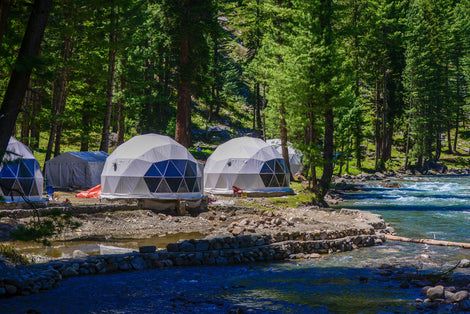Winter Waste Management in Remote Areas
Living off the grid in cold climates brings a set of unique winter challenges, and waste management is right near the top of that list. With freezing temperatures and limited access to municipal services, keeping waste systems running smoothly can take some thoughtful planning.
When you add wind, snow, and icy terrain into the mix, managing basic needs like waste can become a major headache. And for people living in remote areas, repairs or workarounds aren't always easy to get done fast.
That's where smart, self-contained systems come into play. If you're living off-grid, you're probably already good at thinking ahead and finding efficient solutions. One area that continues to prove useful during the cold months is composting toilet systems.
These setups don't just give you peace of mind during winter, they simplify waste management year-round while reducing environmental impact. Let's look at the common issues waste systems face during the winter and why composting systems are a reliable alternative.
Common Waste Management Issues In Winter
When temperatures drop, traditional plumbing setups start to feel the pressure. Standard septic and waste systems often rely on water flow and underground tanks that can freeze or back up during colder months. If components freeze or pipes burst, it can lead to clogs, unpleasant odors, and long repair times. Managing waste in winter isn't just an inconvenience, it can turn into a big health problem if it's not handled properly.
Here are a few common problems that come up:
1. Pipes or holding tanks can freeze, which stops waste from flowing properly.
2. Cold slows down decomposition in standard septic systems.
3. Snow buildup can block access to waste disposal areas.
4. High waste volume caused by more time spent indoors increases pressure on systems.
5. Greywater disposal may be harder when the ground is frozen.
6. Traveling to off-site disposal locations becomes tougher or even impossible.
People living in remote spaces can't always run to the store or call someone for repairs. That means it's even more important to have equipment that's designed to function without constant oversight or a risk of freezing up. Composting toilet systems, which don't depend on water and aren't buried underground, naturally solve some of these winter challenges with far less effort.
Advantages Of Composting Toilet Systems
Composting toilets work without traditional plumbing or a septic tank. Instead, they use a biological process that turns waste into safe, odor-free compost. They separate liquids from solids to help everything break down faster and cleaner. The process uses natural airflow and microbial action, which means no chemicals or running water is necessary.
Compared to water-based systems, composting toilet systems come with a list of benefits that make them practical, especially in cold conditions:
1. No frozen pipes, since there's no need for running water.
2. Reduced smell, due to the separation and aerobic breakdown of waste.
3. No dependency on underground tanks, which can be hard to service during winter.
4. Eco-friendly operation without wasting water.
5. Easy to maintain with simple cleaning and waste-emptying routines.
One practical example is a cabin in a snowy, off-grid forest area. The owner used to rely on a makeshift outhouse, which became nearly unusable as snow piled up. After switching to a composting toilet system inside the cabin, waste was safely contained, cleanup was simple, and trips outside in the freezing morning were no longer necessary. When you're managing everything on your own, having a toilet that just works, no matter the weather, makes everyday life a whole lot smoother.
Implementing Composting Toilet Systems In Remote Areas
Once you've decided to make the switch, choosing the right composting toilet system is the next step. For remote areas, it's a good idea to look for features that make everyday use and maintenance more convenient. That includes things like larger capacity units, manual mixers, or options that don't rely on electricity. Self-contained systems can be easier to install and maintain, especially if your off-grid setup doesn't support complex plumbing.
Take time to assess the space where the system will go. Ventilation matters, both for odor control and for helping the composting process run smoothly. If you're installing it indoors, a unit with a built-in fan powered by a small solar panel can keep airflow moving, even during long stretches of cold weather.
To keep the system running properly, stick to a simple routine:
1. Stir the compost pile regularly if your unit has a mixer.
2. Add cover material like wood shavings or peat to help reduce moisture.
3. Empty the liquid container more often during winter to keep it from overflowing or freezing.
4. Keep the inside of the unit dry and seal it properly when not in use.
5. Use a bucket system or compost bin nearby for easier long-term removal and breakdown of waste.
A strong maintenance habit makes the system more reliable. Don't let solids stack too high or forget about the vent filters. If your system uses AC or DC-powered fans, check for blockages and clear them out once a month.
Enhancing Your Off-Grid Setup With Solar Power
Running off-grid doesn't mean giving up on comforts or good systems. Solar kits play a big role in making remote home setups self-reliant. When you're using a composting toilet system, pairing it with a dedicated solar kit helps with more than powering the fans or vent systems. It brings extra value by supporting lights, sensors, or small pumps you might bring into the picture later on.
Solar energy fits well into what composting toilets are all about, working with nature, not against it. Together, they create a closed-loop system that's cleaner and easier to keep up year-round. You stay less dependent on fuel, water lines, or inconvenient supply runs.
Here's where solar can help when paired with a composting toilet:
1. Run a vent fan to improve airflow and speed up composting.
2. Power a small heater in the compost chamber for year-round performance.
3. Run LED lights to keep the area safe and well-lit.
4. Power liquid agitators or pumps in more advanced systems.
5. Support battery stations for checking sensor data, where available.
Solar kits range in size and function, so you don't need to go big. Even a basic solution can handle what a composting toilet needs. The key is setting up the system correctly first and expanding as you go.
Making Winter Waste Management Easy
Once your composting system is installed and backed up by solar energy, cold-season waste management gets a lot easier. You spend less time digging around or dealing with frozen pipes. Cleanup and care turn into simple routines you can do without much effort.
Don't wait until something breaks. The goal is to stay ahead of the weather by thinking through possible weak spots. Plan your waste system like you'd plan your food or water needs, make sure it's ready for longer stretches when outside help isn't available.
Remember these tips to keep your winter setup running smoothly:
1. Prep enough cover material and store it somewhere dry.
2. Dump waste into your composting bin before it gets too full or frozen.
3. Seal your liquid tank tightly and empty it often.
4. Keep snow away from vents or exterior access doors.
5. Avoid putting trash or synthetic items into the compost chamber.
6. Stay consistent with your maintenance routine even when it's cold.
Sometimes, winter can stretch out longer than expected. Having a streamlined system that you can depend on will take a lot of pressure off when you're dealing with other winter tasks like heating, water collection, or food storage.
Keeping Your Remote Home Comfortable and Sustainable
Living off-grid during the colder months asks a lot from your setup. Your systems need to hold up against snow, ice, and freezing winds all while keeping things running smoothly inside your home. Composting toilet systems are one piece of the puzzle, making waste something you don't have to worry about.
They help shrink your impact on the land, give you more independence, and work well with solar power in just about any setup. When done right, the whole system blends right into your daily routine. You don't have to fuss with it every hour, and you don't need to panic when the temperature drops ten degrees overnight.
Each winter might bring a bit of unpredictability, but your waste setup doesn't have to. Composting toilets paired with solar give you a system that runs cleaner, stays reliable, and supports the kind of lifestyle that makes living off-grid worth it.
Enhance your off-grid lifestyle this winter with eco-friendly innovations. Green Vista Living offers solutions to keep your remote home comfortable and efficient. Discover how integrating composting toilet systems with off grid solar kits can transform your waste management into a sustainable venture. Embrace the peace of mind that comes with reliable, year-round functionality tailored for off-grid living.







